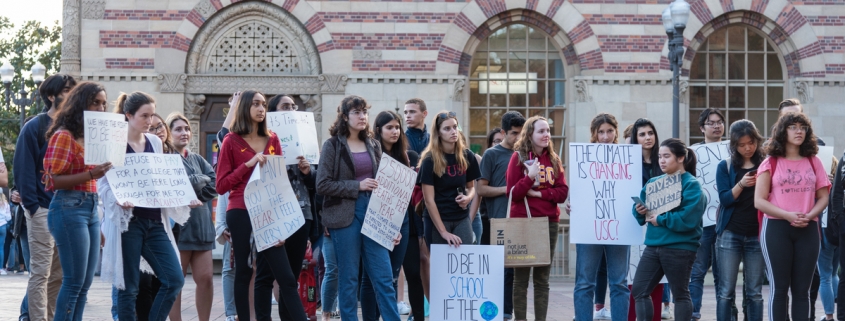Students rally for fossil fuel divestment

Students and faculty crowded around Tommy Trojan Monday bearing posters with slogans like “No time for fossil fools” and “I refuse to pay for a college that won’t be here long enough for me to graduate” to protest USC’s role in advancing climate change through their investments in fossil fuels.
More than 100 students attended the Divest SC Rally hosted by Environmental Core and the Environmental Student Assembly, which was co-sponsored by nine other programming boards in the Undergraduate Student Government, including the Latinx Student Assembly, the Queer and Ally Student Assembly and the Black Student Assembly.
Organizers planned the strike after sending a letter to President Carol Folt in December demanding that USC disclose details of its $5 billion endowment, specifically its investments in fossil fuels.
In response to the December letter, Folt’s office reached out this week to the Divest SC Rally organizers to coordinate a day to speak with students about their demands and questions regarding divestment.
“From the moment I arrived [at USC], I received questions about [divestment],” Folt wrote in a statement to the Daily Trojan. “At the time I said it was important to me, but not something I could tackle in my first semester given other demands. I’m speaking with members of the Investment Committee and will be meeting with students … later this month.”
Tianna Shaw-Wakeman, co-organizer and Environmental Core representative, started the protest by telling students they didn’t need to know the details of investing to understand its impact on younger generations.
“If you understand that investing in fossil fuels is investing in human suffering, is investing in us not having a future, that’s all you need to know [in that] USC must … make our futures better, must divest,” Shaw-Wakeman said.
ESA co-director Nathaniel Hyman led the crowd through chants of “Divest! Divest! It’s in our best interest!” and reminded attendees about the growing number of studies showing how little time is left to reverse the effects of climate change.
Hyman called out world leaders and USC administration for expecting individuals to make their own sustainability efforts when the fossil fuel industry accounts for 76% of the carbon emissions in the United States.
“The University has been telling you to turn off your AC and use a fan to save energy, has told you to carry around a metal straw, has told you that climate change is a wicked problem,” Hyman said. “And has also been telling its investment office to invest in coal, natural gas and petroleum oil.”
As sounds from the rally echoed throughout Trousdale Parkway, ESA co-director Claire Mauss addressed the crowd in English and Spanish. She informed the crowd that more than half of people of color live within 30 miles of an oil rig, which seriously affects their health in the long run.
“People of color are way more affected by problems with pollution and their health,” Mauss said. “When we fight for ourselves, we’re not just fighting for us, we’re fighting for our entire community. It’s really important that we remember that we’re not just these privileged students fighting for divestment, we are fighting for something that is bigger than all of us.”
Protest leaders encouraged students to add their personal stories to the dialogue by voting, lobbying and spreading awareness about climate change.
Jenni Hunting, a freshman majoring in international relations and environmental studies, said she attended the rally to protest the University’s investment in an industry that could threaten her future.
“For me, it’s just holding USC accountable to their sustainability promise because … all over campus, I see signs saying, ‘We’re a sustainable campus, zero waste!’ and frankly, it’s bullshit if we’re continuing to invest in fossil fuels,” Hunting said.
Hyman ended the event by reminding students that in order to enact real change, the school needs to know that these issues matter to the student body as a whole, not just a select few. He also let attendees know that President Folt plans to meet with the coordinators of the event later this week to discuss the University’s potential divestment from the fossil fuel industry and reinvestment in renewable energy.
“At the end of the day … I believe [Folt] is conscious of the issue, and I believe what she needs is a legitimization both to her and the Board of Trustees that these demands are legitimate, they’re profitable and they have precedence in other countries and other institutions,” Hyman said. “We just need to keep on making our case.”

